How Russia's high-tech start-ups are looking beyond oil
- Published
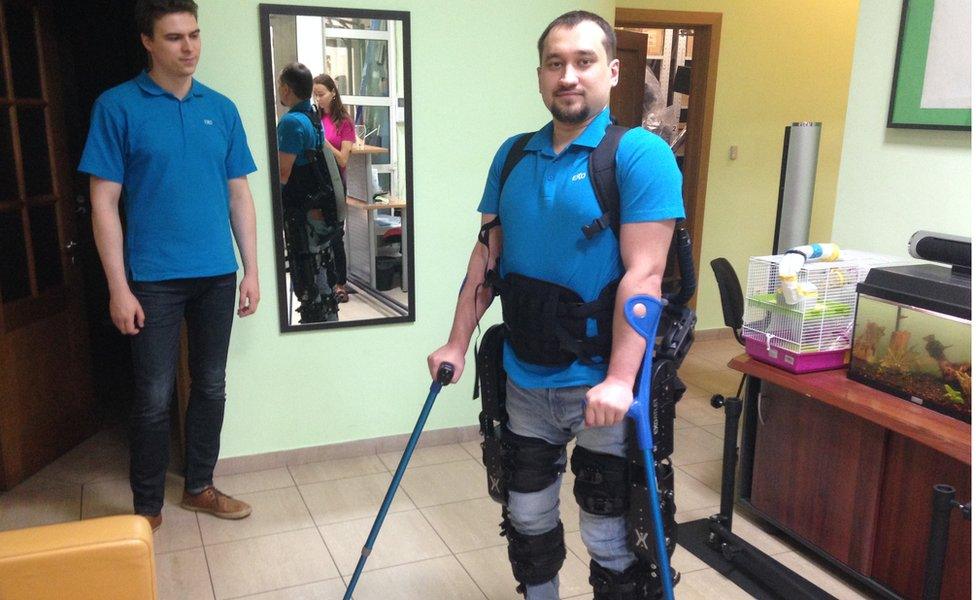
Oil and gas form the bedrock of Russia's economy and swings in world energy prices can push the country from boom to bust. But can Russia diversify?
In a crowded lobby of an office building near the centre of Moscow, between a fish tank and a hamster cage, Denis is strapping on a robotic skeleton. With a loud whirring, he heaves himself upright and sets off down the corridor.
"It's amazing!" he says.
This would be less impressive if it wasn't for the fact that Denis is paralysed from the waist down. The exo-skeleton he is demonstrating is made by ExoAtlet, one of Russia's new breed of tech companies, a sector that the Russian government hopes will help move the economy away from its reliance on energy.
Ekaterina Bereziy, chief executive and co-founder of ExoAtlet, says the machine doesn't promise that paralysed people will suddenly walk unaided. Instead it's more likely to be used for stroke rehabilitation.
But Ekaterina's company is unusual. Russia is a country rich in natural resources with an abundance of hydrocarbons such as oil and gas and this is what the economy is based on.
"We in Russia literally do not have presidents being people, it's oil being the president of Russia," says Andrey Movchan, an independent economist at the Moscow Carnegie Centre think tank. "When oil is cheap, living is bad... essentially when Putin came [to power] oil started to climb and we had good times. Now we have decent times."
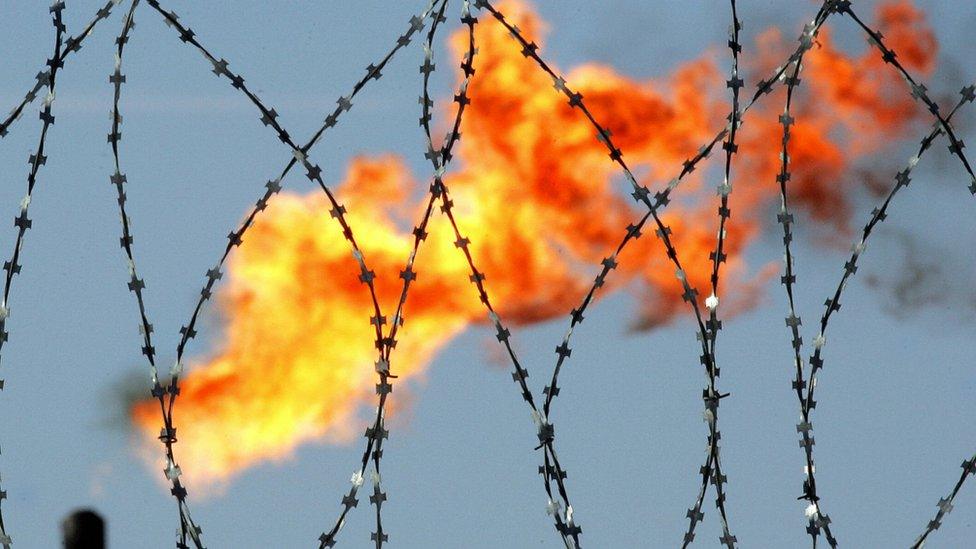
Russia has a large, economically vital, oil and gas sector
This reliance on oil is underlined by Russia's exports, 80% of which are directly related to hydrocarbons, according to Mr Movchan. But is this really such a problem?
"Yes and no," he says. "If you look from the Kremlin everything is OK. The budget deficit is 2% of GDP, which is absolutely affordable. For the ministers, for the government and for the president the situation in Russia is very stable and very good."
On the other hand, he argues: "If you look from a regular window from a regular 24-storey house in a Moscow suburb, the situation is bad, incomes are going down and it's harder and harder to maintain the standard of living."
Russia is emerging from two years of recession. The huge decline in the worldwide oil price in 2014 caused the economy to contract sharply. On top of that the US and EU imposed economic sanctions on Russia following its annexation of Crimea in 2014.
The value of the rouble fell with the oil price and consumers stopped spending as incomes were squeezed. The Russian economy is forecast to return to annual growth this year.
So what hope is there of finding an alternative to oil?
Ekaterina Bereziy of ExoAtlet is optimistic for tech companies like hers. "Ten years ago it was completely impossible to do anything in this area - we could never get any grant money for research and development. But now it's possible. Now there are a lot of initiatives."
ExoAtlet received money and support from Skolkovo, a government-funded organisation for the high-tech sector in Russia that was set up by then President Dmitry Medvedev seven years ago. It was ambitiously billed as Russia's answer to Silicon Valley.
Skolkovo is a new city in the making an hour's drive beyond the suburbs on Moscow's traffic-clogged roads. The centrepiece is the techno-park where about 25% of the 1,700 companies supported by Skolkovo are already installed.
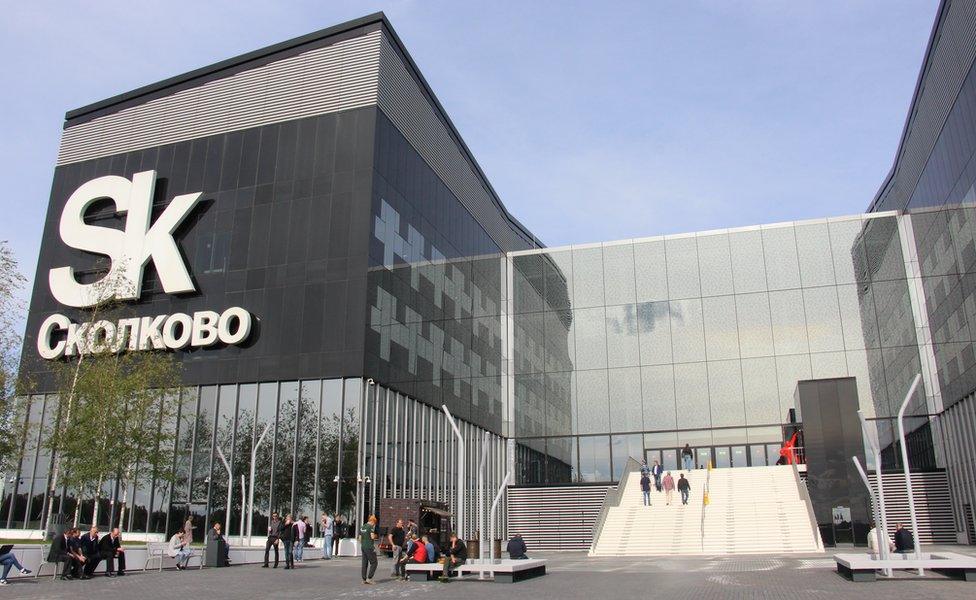
The city of Skolkovo is said to be Russia's answer to Silicon Valley
It provides grants, worth a total of $20m (£15m) a year, as well as support in areas such as marketing and access to laboratories and equipment. The companies are also exempt from paying tax.
However, critics say that too much state money has gone into Skolkovo. It's cost about $2.2bn (£1.7bn) to build, with little financial return. And, as with some other big Russian state projects, in the early years it was dogged by allegations of corruption.
"It was a difficult period of time, the first years of the project," explains Igor Drozdov, chairman of the Skolkovo Foundation, "because many people didn't believe that it was possible to create something here. I think all the problems came from this."
Clearly Skolkovo has not replicated the success of Silicon Valley in California but Mr Drozdov insists that "if we're talking about Skolkovo start-ups I would say around 40 to 50 companies are already global leaders in their niches."
But doing business in Russia is unpredictable, as I found out from one company with an office at Skolkovo. Tion makes air purification systems for industry as well as households.
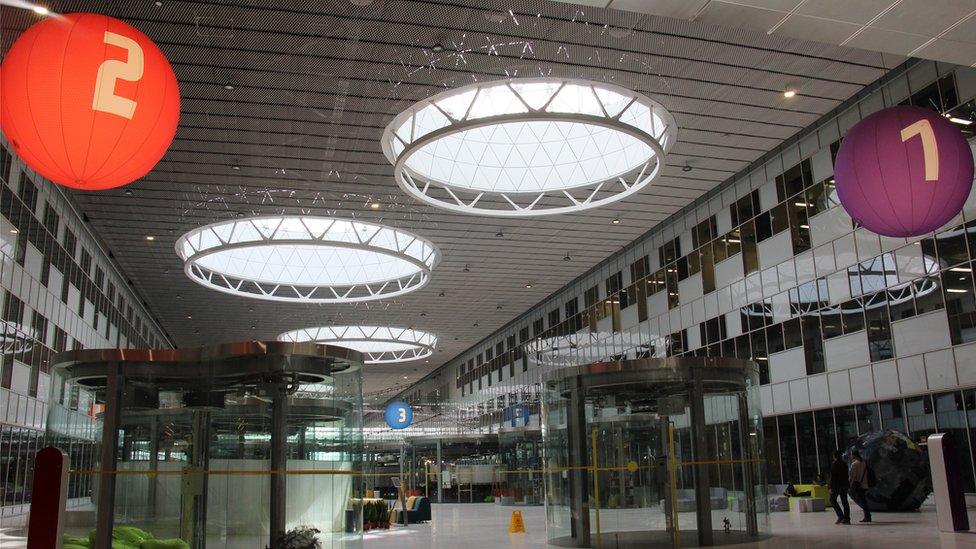
Many companies now operate from Skolkovo's techno park
Most of the company is based in the Siberian town of Akademgorodok. Last summer, after having updated the air purifiers it makes for use in hospitals, its boss, Dmitri Trubitsyn, was placed under house arrest, accused of breaching a 2015 law that made selling unregistered or counterfeit medical equipment a criminal offence.
He denies the charges and 5,000 people signed a petition appealing to the president to halt the case. In Russia you have to certify products whenever you modify them, not just when they are released, a process which may take years.
Mikhail Amelkin, Tion's chief technical officer, told me that "there was a situation when we didn't manage to get all the certificates in time". But he also believes that "somebody didn't like the fact that Tion is growing so rapidly and Tion dominates several markets".
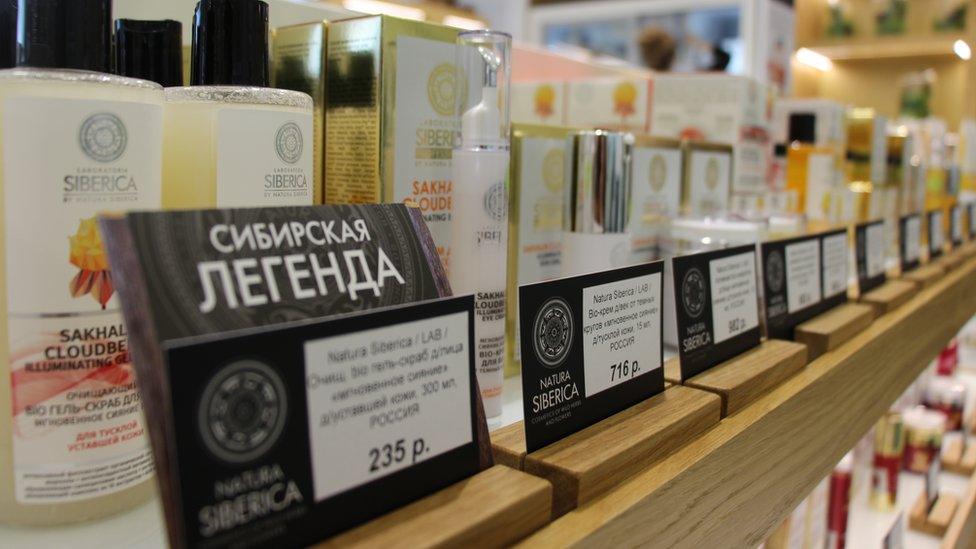
The Russian cosmetics firm, Natura Siberica, has been a success story
Andrei Trubnikov has built up a cosmetics empire based on Siberian plants. He set up Natura Siberica with $5,000 in the late 1990s.
Today it has an annual turnover of about $300m (£225m), employs 4,000 people worldwide and exports to 45 countries. Andrei is a man of few words but as we walked around his flagship central Moscow store he was keen to tell me: "I'm not a political man you know. I don't like politics."
His biggest challenge at the outset was persuading Russian women to buy Russian cosmetics. But when sanctions were imposed on Russia in 2014 and President Putin retaliated with counter-sanctions, he says Russians began to take Russian-made products more seriously.
The recession and fall in the value of the rouble had also made imports much more expensive.
In spite of the difficulties businesses in Russia face, many do survive and even thrive. But bureaucracy, corruption and a weak legal system are all cited as barriers to entrepreneurship and, until that environment changes, wholesale diversification of the Russian economy is highly unlikely.
Caroline Bayley's report is on Global Business on BBC World Service on Saturday 25 and Sunday 26 November and on In Business on BBC Radio 4 at 20:30 on Thursday, 14 December and 21:30 on Sunday, 17 December.
- Published25 March 2024
